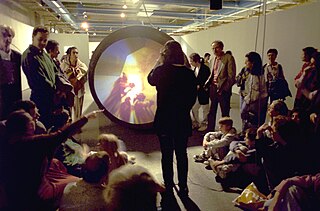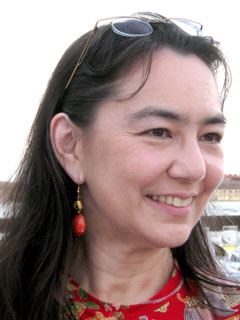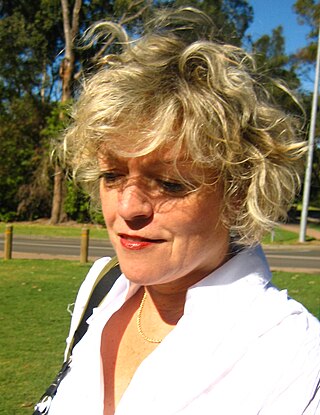Related Research Articles

Interactive art is a form of art that involves the spectator in a way that allows the art to achieve its purpose. Some interactive art installations achieve this by letting the observer walk through, over or around them; others ask the artist or the spectators to become part of the artwork in some way.

Rebecca Allen is an internationally recognized digital artist inspired by the aesthetics of motion, the study of perception and behavior and the potential of advanced technology. Her artwork, which spans five decades and takes the form of experimental video, large-scale performances, live simulations and virtual and augmented reality art installations, addresses issues of gender, identity and what it means to be human as technology redefines our sense of reality.

John Maeda is a Vice President of Design and Artificial Intelligence at Microsoft. He is an American technologist and designer whose work explores where business, design, and technology merge to make space for the "humanist technologist."

Mary Flanagan is an American artist, author, educator, and designer in the field of game studies. She is the founding director of the research laboratory and design studio Tiltfactor Lab at Dartmouth College. She is the author of scholarly books from MIT Press, including Playing Oppression: The Legacy of Conquest and Empire in Board Games,Values at Play in Digital Games, and Critical Play: Radical Game Design. She is the CEO of the board game company Resonym. Her artwork has exhibited at museums such as the Whitney Museum and The Guggenheim.

Electronic textiles or e-textiles are fabrics that enable electronic components such as batteries, lights, sensors, and microcontrollers to be embedded in them. Many smart clothing, wearable technology, and wearable computing projects involve the use of e-textiles.

Nicole Stenger is a French-born American artist, pioneer in virtual reality and Internet movies. In 1989 to 1991, she was a research fellow at MIT. In 1991 to 1992, she was a visiting scholar at the Human Interface Technology Laboratory (Hitlab) in Seattle. Her works have been featured in the SIGGRAPH Art Show, the FILE Festival, the JavaMuseum, the Cartier Art Foundation and are part of the Archive of Digital Art (ADA). In 2013, she was included in the "Contemporary women artists on the web" collection of the National Museum of Women in the Arts, in Washington, D.C. To this day, Stenger is considered to be one of the first artists to explore the artistic virtual reality medium.
Anne Morgan Spalter is an American new media artist working from Anne Spalter Studios in Providence, Rhode Island; Williamsburg, Brooklyn; and Brattleboro, Vermont. Having founded and taught Brown University's and RISD's original digital fine arts courses in the 1990s, Spalter is the author of the widely used text The Computer in the Visual Arts. Her art, writing, and teaching all reflect her long-standing goal of integrating art and technology.

Tamiko Thiel is an American artist, known for her digital art. Her work often explores "the interplay of place, space, the body and cultural identity," and uses augmented reality (AR) as her platform. Thiel is based in Munich, Germany.

Nadia Magnenat Thalmann is a computer graphics scientist and robotician and is the founder and head of MIRALab at the University of Geneva. She has chaired the Institute for Media Innovation at Nanyang Technological University (NTU), Singapore from 2009 to 2021.
Adrianne Wortzel is an American contemporary artist who uses robotics and interaction between humans and machines in her installations and performances. She has also created many online works.
Tiffany Holmes is an American new media artist and educator. She is based in Chicago, Illinois.
Maggie Orth is an American artist and technologist who helped create the field of E-textiles. Her 2001 MIT Media Lab PhD thesis, Sculpted computational objects with smart and active computing materials and associated publications and patents are among the early work in this field. She was named a 2007 United States Artists Target Fellow. The United States Artists foundation describes her as "A pioneer of electronic textiles, interactive fashions, wearable computing, and interface design". She founded "International Fashion Machines"., which created e-textile products.

Ernest Edmonds is a British artist, a pioneer in the field of computer art and its variants, algorithmic art, generative art, interactive art, from the late 1960s to the present. His work is represented in the Victoria and Albert Museum, as part of the National Archive of Computer-Based Art and Design.
Sha Xin Wei is a media philosopher and professor at the School of Arts, Media + Engineering in the Herberger Institute for Design and the Arts + Ira A. Fulton Schools of Engineering at Arizona State University. He has created ateliers such as the Synthesis Center at Arizona State University, the Topological Media Lab at Concordia University, and Weightless Studio in Montreal for experiential experiments and experimental experience.

Marcelo Coelho is a Brazilian American computation artist and designer. His work focuses on the boundaries between matter and computation, and includes interactive installations, photography, wearables, and robotics. Coelho is currently Head of Design at Formlabs, a Lecturer at the MIT School of Architecture and Planning and Principal Investigator at MIT's Design Intelligence Lab, a research lab inventing new forms of expression and collaboration between human and machine intelligence.

Ingrid Bachmann is a Canadian contemporary artist based in Montreal known mostly for her interactive kinetic sculptures that mix technology and ordinary everyday objects. Her work has been exhibited throughout Canada, and internationally in the United States, Peru, Brazil, Germany, Belgium, Scotland, Australia and Cuba. Exhibitions include the 11th Havana Biennial (Cuba), the Quebec Biennial, Manifestation d’art International 6 (Canada), Flesh of the World (Canada), Command Z: Artists Exploring Phenomena and Technology (USA), and Lab 30 (Germany).
Monika Fleischmann is a German research artist, digital media scientist, and curator of new media art working in art, science, and technology. Since the mid-1980s she has been working collaboratively with the architect Wolfgang Strauss. As part of their research in New Media Art, Architecture, Interface Design and Art Theory, they focus on the concept of Mixed Reality, which connects the physical with the virtual world.

Behnaz Farahi is an Iranian-born American interdisciplinary designer and educator whose work melds architecture, fashion, interaction design, computational design, wearable technology and the human body. Currently, she is an Assistant Professor at the MIT Media Lab. Her designs often explore the possibilities of human interaction with the environment and how technology can facilitate this interplay. Her work engages with the human body's relationship to its surroundings and how wearable technology can respond to, or be influenced by stimuli such as human emotions or environmental factors. Leveraging technology and art, Farahi's works are commentaries on power dynamics, society, and identity, frequently drawing inspiration from her cultural background and Western theories and practices, underpinned by theoretical concepts including socio-political feminist theory and anthropology.

Eric Singer is a multi-disciplinary artist, musician and software, electrical, computer, robotics, and medical device engineer. He is known for his interactive art and technology works, robotic and electronic musical instruments, fire art, and guerilla art.

Daniel Jolliffe was a Canadian media artist and art professor who created works of art, design and performance projects using technologies such as Global Positioning Systems (GPS). His interactive kinetic work and public art has been exhibited in the United States, Canada and abroad.
References
- ↑ Rodger, Caroline (2015-08-27). "PERSONNALITÉ DE LA SEMAINE Joanna Berzowska - La Presse+" (in Canadian French). La Presse. Archived from the original on 2016-09-13. Retrieved 2016-09-22.
- ↑ Duguay, Denise (2016-08-09). "Journalist Sue Montgomery, rapper Koriass among Distinction Award winners named by Montreal Women's Y". Montreal Gazette. Retrieved 2016-09-22.